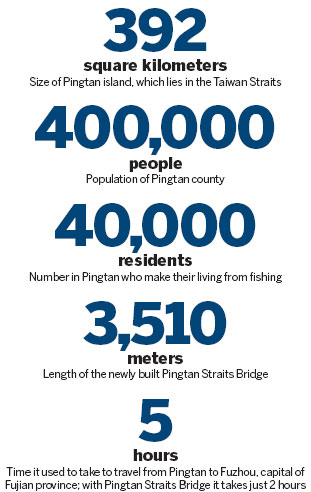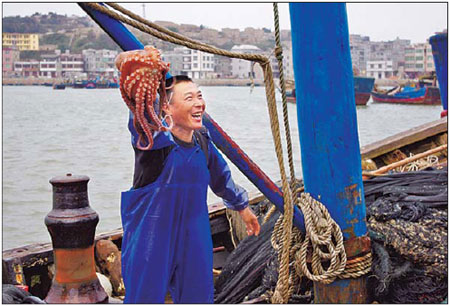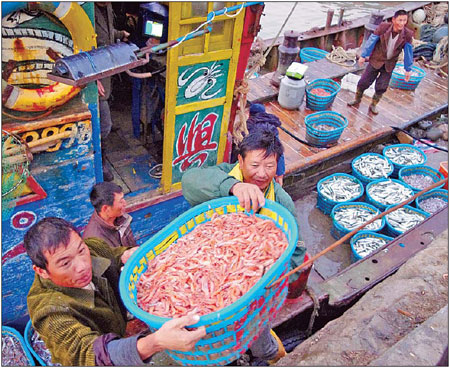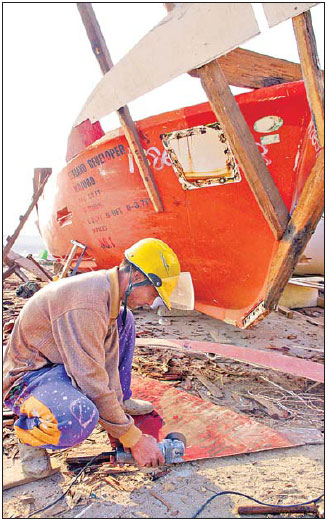Focus
Cross-sea bridge offers a route to prosperity
By Peng Yining and Hu Meidong (China Daily)
Updated: 2011-01-05 08:21
 |
Large Medium Small |
|
A fisherman displays an octopus as he sells his catch at Dong'ao pier in Pingtan, Fujian province, in this file photo taken in December. Peng Yining / China Daily |
|
Fishermen unload their hauls of shrimp and fish at Dong'ao dock in Pingtan, a small island county in Fujian province that lies 125 kilometers west of Taiwan's northwestern city of Hsinchu. The island was selected as a cross-Straits cooperation zone in 2009. Photos by Peng Yining / China Daily |
|
Zhou Qiuxing, 46, repairs a boat on Pingtan island. He bought two vessels last year with six others from Dong'ao village after quitting his job with a Taiwan employer. |
Development zone helps islanders emerge from isolated past. Peng Yining and Hu Meidong report from Xiamen.
Zheng Xialao burst into tears when he traveled across the newly built Pingtan Straits Bridge for the first time.
"It's a dream come true," said the 77-year-old as he rode a tour bus over the 3,510-meter crossing.
"Soon, Pingtan county will be prosperous, and not just an isolated island. There will be factories and my grandchildren will be able to find good jobs."
The retired fisherman is not the only one who hopes the completion of Fujian province's first cross-sea bridge is a sign of things to come.
After being selected as a cross-Straits development zone due to its close proximity to Taiwan, Pingtan's 400,000 or so residents have been eagerly awaiting a revival of the island's flagging fortunes. In announcing the move, authorities promised an influx of new investors and employers.
"If the project brings more jobs, my daughter can stop drifting from city to city as a migrant worker," said Lin Yun, 46, who runs a small fish food business. "She can come home."
Previously, villagers had to rely on ferry services to reach the mainland, with a trip to the provincial capital, Fuzhou, usually taking five hours. By using the new Pingtan to Fuqing crossing, the journey can be completed in two.
Excitement in the run-up to the bridge opening on Nov 30 was palpable. Some pensioners visited the construction site as much as once a week to check on the progress, said Zheng, who was given a free tour on one of 11 buses arranged by county officials.
"The bridge is just the first step," said Li Yiren, deputy director of the county's publicity office. "More changes, more jobs and more business opportunities are on the way."

Fishing community
Pingtan, which lies 125 kilometers west of Taiwan's northwestern city of Hsinchu and was selected as a cross-Straits cooperation zone in July 2009, is stretched over 392 square kilometers. However, the vast majority of residents are concentrated in western settlements, facing the mainland.
Farming here is difficult due to the high salinity of the soil and the lack of fresh water (most fruit and vegetables are shipped in), yet more importantly the lack of convenient transport links has prevented the island from developing any large industries.
More than 40,000 people still make their living fishing the shallow waters off Pingtan's coast.
"Fishing is dangerous, tiring and the pay is extremely low," said Zhou Qiuxing, 46, a fisherman from Dong'ao village. "We even work in deadly storms."
Like many others, Zhou spends months at sea on a 20-meter-long boat. His face is already a deep tan, while his hands are rough with calluses.
"The work is far too dangerous. I will never let my children do it," he said, before explaining that he had invested in two new boats this year to help pay college tuition for his 20-year-old son and 23-year-old daughter. "I'd love to be able to do a different job, but there aren't many choices here," he added.
With prices around 100,000 yuan ($15,000), not all villagers can afford to buy fishing boats, forcing many to turn to Taiwan employers.
The central government unveiled a policy that allowed fishermen from Pingtan and other coastal regions to work on Taiwan fishing vessels in 1988 and, during the 1990s there were roughly 3,000 Pingtan residents working for Taiwan bosses at any one time.
However, although the average salary has steadily risen over the past three decades to 2,600 yuan, the number of Pingtan fishermen with Taiwan firms was just 700 in 2010.
"A mainland fisherman can cost half as much as one from Taiwan but many are now working for more money as migrant workers in big cities instead," said 48-year-old former fisherman Yu Changmao, who added that Taiwan trawlers sail out after Spring Festival and usually do not return until the following year.
According to official data, roughly 50,000 young people have left Pingtan Island in search of better employment opportunities since the 1980s. Most are working in tunnel construction and on ocean liners.

Popular port
Pingtan was first founded as a cross-Straits commerce port during the Qing Dynasty (1644-1911). Today, islanders have more than 200,000 relatives in Taiwan.
Lin Wenmin, a 74-year-old retired county official, said he remembers seeing businessmen rowing white boats across the Straits in the 1940s. "They sold fish, and bought sugar and rice from Taiwan," he said.
Despite a ban on "bartering" in the 1980s, Lin said Pingtan fishermen still exchanged their hauls for Taiwan products like watches and umbrellas, which at the time were still "rare and precious on the mainland".
"We rowed our boat and exchanged our goods," recalled Yu Changmao, who now works as a dock watchman. "I once bought a watch with 25 kg of fish."
Pingtan's Dong'ao dock was one of the Chinese mainland's earliest "Taiwan ship mooring points" and since the late 1970s has welcomed 20,000 merchant fleets and 100,000 residents from Taiwan.
At its peak, more than 30 ships were arriving every day, prompting local authorities to build hotels and office buildings on the dock.
"People became rich trading with Taiwan businessmen," said Lin, "but in the early 1990s cooperation was suspended for security reasons and the boom times ended."
By 2000, just two or three Taiwan vessels were arriving a day. "Now we're lucky if we get one every two to three days," said Chen Gongliang, who sells marine products in Pingtan.
The hotels and offices built in the 1980s gradually fell into disrepair. A slogan painted on the side of a building that reads "Welcome, Taiwan Compatriots" has all but faded from sight.
"Pingtan's development has been held back as it has been considered a frontier defense area for a long time," said Wu Guogong, a former member of the People's Liberation Army from Pingtan.
In 1996, Beijing conducted a military exercise in waters off Pingtan "to show that the country has the ability to strive for reunification across the Straits, and guard the country's sovereign and territorial integrity", according to a report from Xinhua News Agency at the time.
"Taiwan is five hours away by sail boat," said Yu. "Sometimes a strong wind would blow our boats to the shallow sea around Taiwan and we'd have to row furiously as we weren't allowed to go within 16 sea miles (30 km) of the island."
Future plans
According to plans published by Pingtan county, the cooperation zone is aimed at attracting Taiwan investors and residents through direct trade and shipping services.
There will be a high-tech industrial zone, a chemicals industry along the harbor and an agriculture area, including farms for Taiwan producers, in the north.
Officials are also applying for more preferential policies, including a cross-Straits duty-free market that would appeal to business groups and travelers.
More than 200 businesses worldwide are already exploring new opportunities in Pingtan, while one street now boasts more than 20 newly built budget hotels.
"The cooperation project must bring more visitors," said a Pingtan businessman surnamed Jiang, who explained that he has just opened a decoration company because "once large-scale construction projects start there will be many decoration businesses".
As news of the zone has spread, property prices rocketed from 3,000 yuan to 7,000 yuan per square meter, said publicity official Li Yiren.
However, the project is already helping to change residents' attitudes. Taxi driver Wan Hong, 29, said he had been planning to move his family away before the 2009 announcement but decided to stay as "it looks like a great opportunity".
"I don't care if the project makes a breakthrough in the cross-Straits relationship, I only care how it will change my life," he said.


